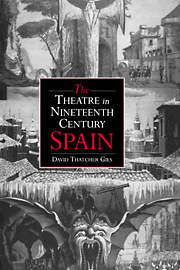Book contents
- Frontmatter
- Contents
- Preface
- Introduction: literary history and canon formation
- 1 Spanish theatre in the nineteenth century. (An overview)
- 2 Theatre and dictatorship: from Napoleon to Fernando VII
- 3 Romanticism and beyond (1834-1849)
- 4 The theatre at mid-century
- 5 “This woman is quite a man!”: women and the theatre (1838-1900)
- 6 High comedy, and low
- 7 Conflicting visions: neo-Romanticism, ridicule, and realism
- Conclusion
- Bibliography
- Index of names
- Index of plays
- Frontmatter
- Contents
- Preface
- Introduction: literary history and canon formation
- 1 Spanish theatre in the nineteenth century. (An overview)
- 2 Theatre and dictatorship: from Napoleon to Fernando VII
- 3 Romanticism and beyond (1834-1849)
- 4 The theatre at mid-century
- 5 “This woman is quite a man!”: women and the theatre (1838-1900)
- 6 High comedy, and low
- 7 Conflicting visions: neo-Romanticism, ridicule, and realism
- Conclusion
- Bibliography
- Index of names
- Index of plays
Summary
Canon formation and the writing of literary history are tricky and unreliable matters. As we have seen, what we typically think of as the “history” of nineteenth-century Spanish theatre is nothing of the sort. Rather, it is a far more complex and varied phenomenon than we are generally led to believe, and to chart it with any degree of accuracy forces us into a series of decisions - choices - which may indeed be the “ideological acts” that Hayden White warned us about. This is precisely what happened as literary history, specifically theatrical history, began to be written in and for the nineteenth century. Cánovas del Castillo, the enormously influential Conservative politician and intellectual, set the tone and the parameters of the debate in the mid-1880s in two works. The first, Autores dramáticos contemporáneos y joyas del teatro español del siglo XIX republished the texts of what he considered to be those “joyas” (“jewels”): Don Alvaro, Juan Lorenzo, Traidor, inconfeso y mártir, El hombre de mundo, ¡Don Tomás!, Los amantes de Teruel, ¡El gran Filóná, Muérete ¡y ver!sá, Guzmán el bueno, El haz de leña, Consuelo, Un drama nuevo, and O locura o santidad.
- Type
- Chapter
- Information
- The Theatre in Nineteenth-Century Spain , pp. 349 - 352Publisher: Cambridge University PressPrint publication year: 1994

